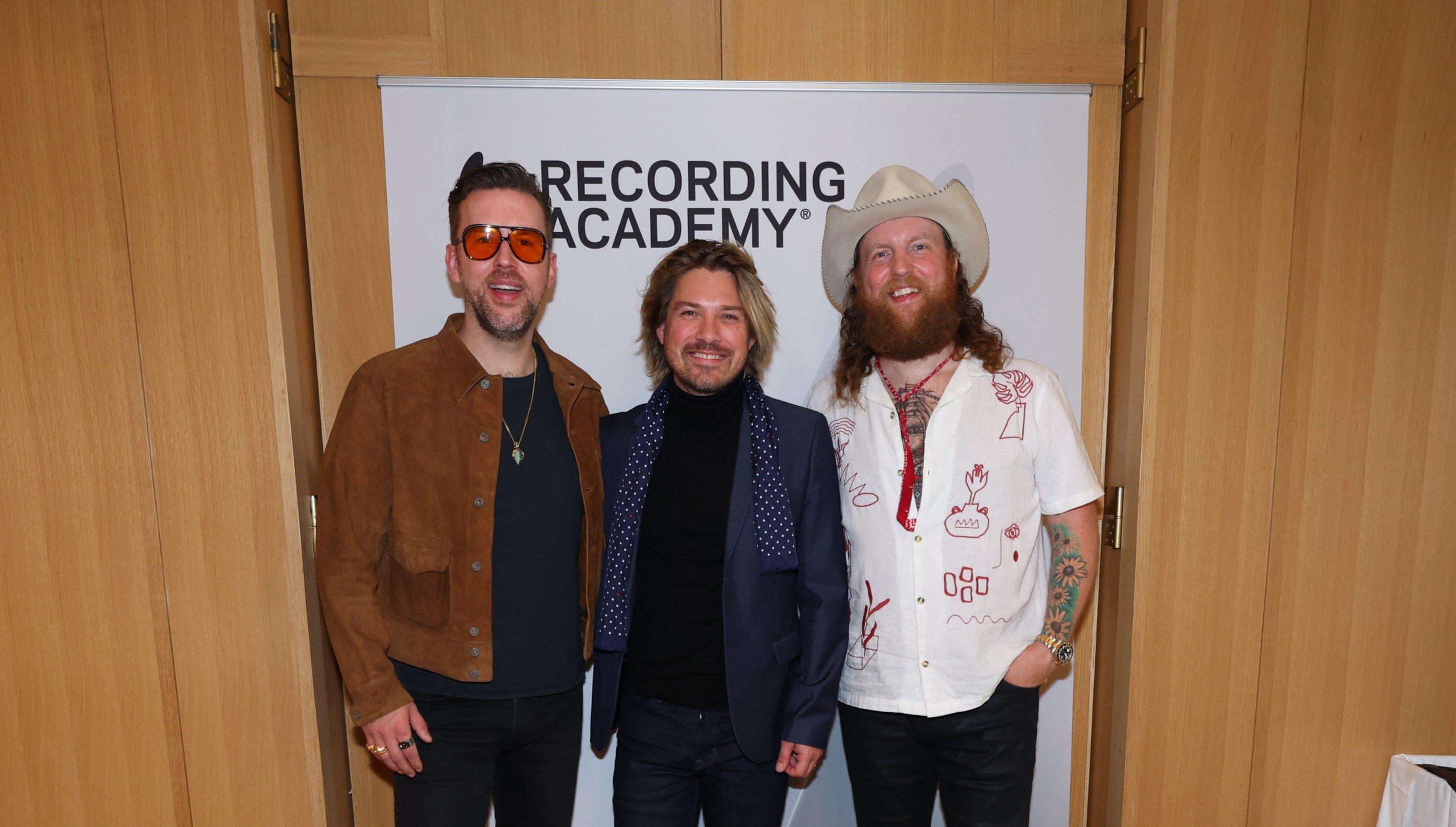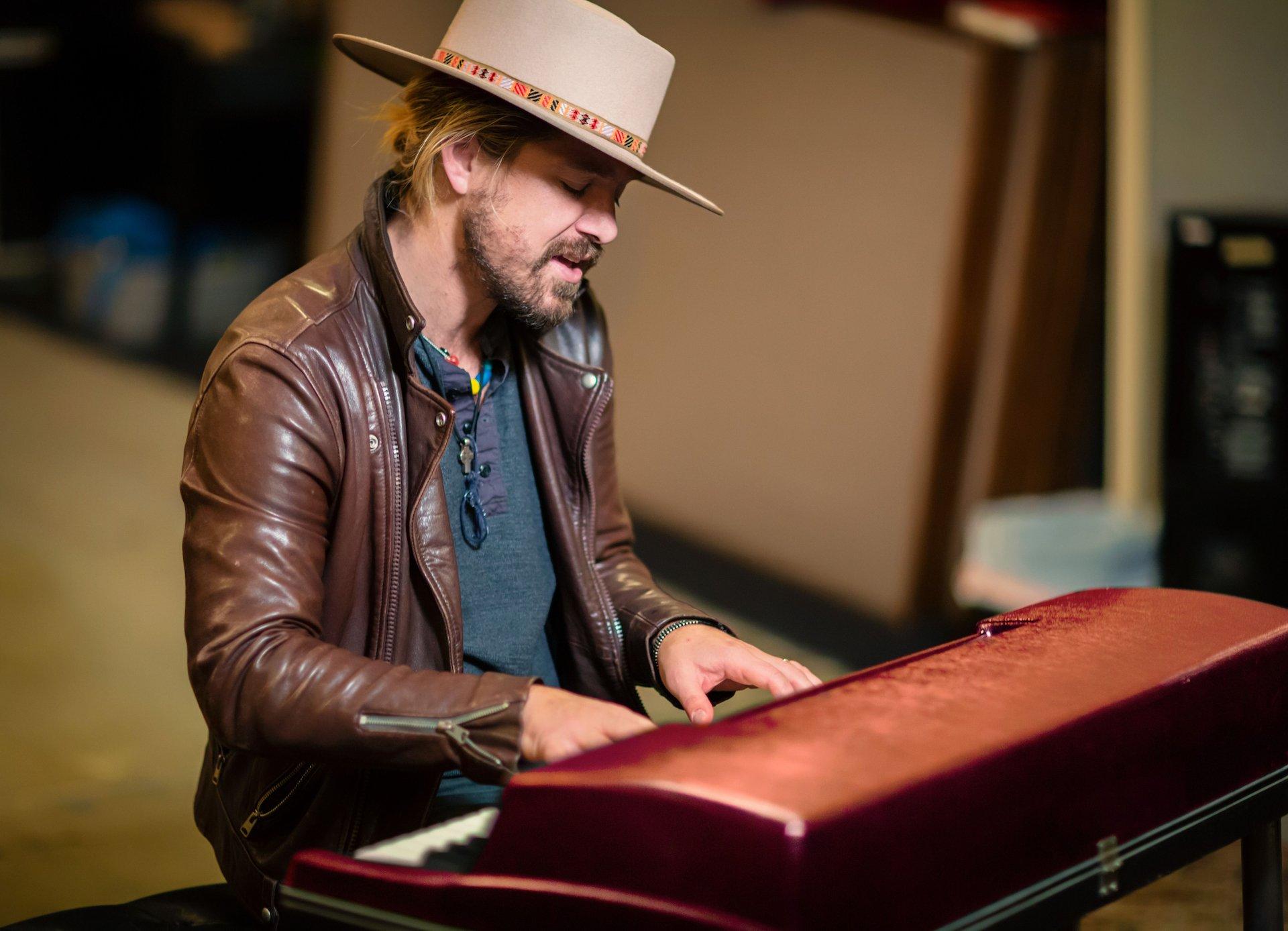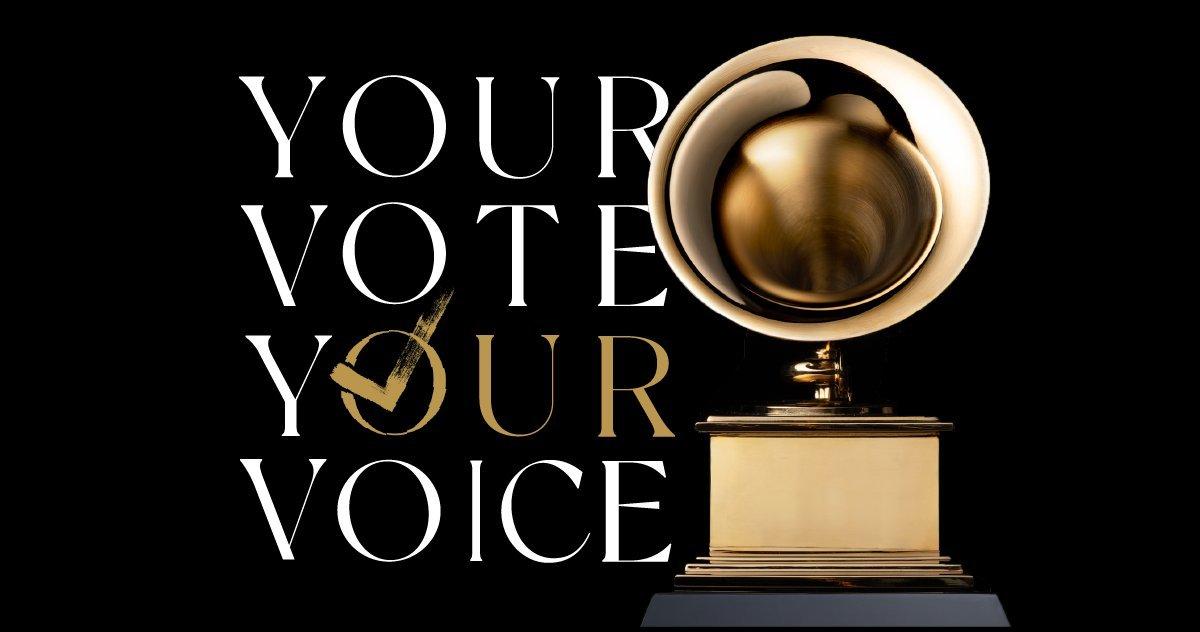Photo courtesy of the Recording Academy

list
How Newly Elected Recording Academy Trustees Are Involved In Advocacy: Dani Deahl, Taylor Hanson & More
Newly elected Recording Academy Trustees Dani Deahl, Taylor Hanson, Torae Carr, and Sara Gazerak have a history of advocacy for music people. Get to know them below.
The Recording Academy's Board of Trustees has a history of being filled with members that are both passionate about making music and advocating for music creators. The newly elected slate of trustees is no exception and four of the new members continuously show their dedication to advocacy.
Those Trustees are Dani Deahl, Taylor Hanson, Torae Carr, and Sara Gazerak. They're four of a total of 19 leaders of diverse backgrounds and disciplines who have assumed their position on the 2024-2025 Board of Trustees.
Effective June 1, the newly elected Trustees joined the Academy's midterm Trustees, including National Officers Tammy Hurt (Chair), Dr. Chelsey Green (Vice Chair), Gebre Waddell (Secretary/Treasurer), and Christine Albert (Chair Emeritus).
Their mission is to uphold the Academy's core values: to serve and represent the music community at-large through its commitment to promote diversity, equity and inclusion, fight for creators' rights, protect music people in need, preserve music's history, and invest in its future.
About that fight for creator's rights, specifically: read on for these four Trustees' advocacy bona fides.
Dani Deahl
This prominent artist, DJ and producer previously served as the Recording Academy's Chicago Chapter Governor. She's also been a prolific advocate for music makers and the greater music industry.
In March, Deahl testified in front of the Illinois House and Senate on HB 4875/SB 3325 alongside fellow Chicago Chapter member Jeff Becker. HB 4875/SB 3325 represents a crucial step towards modernizing Illinois's Right of Publicity Act for the AI era.
By granting additional enforcement rights and remedies, the bill was created to shield musicians from exploitation by generative AI systems. While existing copyright laws offer some protection, the amendments directly address gaps in safeguarding an artist's name, image, likeness, and voice.
Shortly after the Academy and Deahl's advocacy efforts in Springfield, HB 4875/SB 3325 passed through both the Illinois House and Senate and is with Governor J.B. Pritzker waiting to be signed into law.
On Friday, May 3, Deahl participated in the Recording Academy's Inaugural GRAMMYs on the Hill Future Forum. Designed to provide a space to explore the most pressing issues facing music, this momentous occasion served as a pivotal platform to delve into the impact of artificial intelligence (AI) on the music community. The afternoon consisted of a series of panel discussions curated to explore both the promise and the peril that AI presents to music makers.
Deahl joined GRAMMY nominated producer, emcee, vocalist, and thought leader, Kokayi, and Recording Academy's Chief Advocacy & Public Policy Officer, Todd Dupler, for the first panel of the afternoon.
Throughout the discussion, Deahl demonstrated live how she ethically uses AI as a tool to enhance her music, including stem separation, voice or tone replacement, and song generation. Dani also attended and participated in the 2024 GRAMMYs on the Hill Awards and Advocacy Day.
Taylor Hanson
You know that surname: he's a former Texas Chapter President, three-time GRAMMY nominated artist and member of the band Hanson.
Last August, Recording Academy members of the Texas Chapter, including Taylor Hanson, headed to Oklahoma City to meet with state government officials to build up the relationship between the Oklahoma music community and state leaders.
Throughout the day, the group met with Lieutenant Governor Matt Pinnell and the Deputy Director of the Oklahoma Film and Music Office, Jeanette Stanton, at the state's Capitol before heading to the Governor's Mansion.
During the meeting, they discussed the importance of the music community in Oklahoma, ways the state can continue to be involved in supporting the music community, and how the Recording Academy can be a resource for ensuring artists' voices are heard.
At the Governor's Mansion, Hanson participated in a panel with other Texas Chapter members on the Recording Academy and how Oklahoma Academy members and music creators can get involved. Specifically, the group highlighted the Recording Academy's District Advocate Day, which Hanson has been a vocal supporter of.
Taylor Hanson has participated in numerous District Advocate meetings, attended the 2024 GRAMMY Advocacy Brunch, and has also used his social platform to spread awareness about the Recording Academy's grassroots advocacy movements.
Torae Carr
On May 7, 2024, this rapper and former New York Chapter President joined other members of the Recording Academy's New York chapter and took to the state capitol in Albany. The purpose was to advocate for the passage of A 127, a crucial piece of legislation designed to safeguard the creative works of artists across New York.
Throughout the day, the group met with key members of the Assembly to express their support for the bill and highlight the crucial need to protect artistic freedom during legal proceedings.
At the time of the advocacy day, A 127 had already passed through the senate. Since then, it has been voted through the Assembly Codes Committee with the goal to be voted on in the Assembly in the coming days.
Sara Gazerack
Gazerack isn't just a GRAMMY-winning jazz vocalist: she serves as one of the Los Angeles Chapter's Advocacy Representatives and most recently was a Los Angeles Chapter Governor.
This spring, Sarah joined some 60 GRAMMY winners, nominees, and Recording Academy executives in DC for GRAMMYs on the Hill. Sara met with Rep. Jerry Nadler (D-NY), Rep. Larry Bucshon (R-IN), and policy staff of Rep. Katherine Clark (D-MA).
The Advocacy Day consisted of meetings with Senators and Representatives on Capitol Hill and a visit to the White House for a roundtable discussion on AI policy, ticket reforms, the National Endowment for the Arts, and the president's work on gun violence, before a special conversation with Press Secretary Karine Jean-Pierre.
The Recording Academy commends these Trustees for their commitment to advocacy for music people — and to follow their future work in this regard, keep checking RecordingAcademy.com/Advocacy for up-to-date info!
Illinois Passes AI Digital Replica Protections Law: What To Know About HB 4875

Photo: Rebecca Sarkar
video
It Goes To 11: Taylor Hanson Gushes Over His Vintage Wurlitzer Electric Piano
In the newest episode of It Goes To 11, watch Hanson’s Taylor Hanson detail what he loves about his red Wurlitzer 200 Series piano — and why it’s an icon in both pop and rock and roll
If you’ve ever seen Hanson perform live, you’ve probably witnessed Taylor Hanson playing a red miniature piano. What you may not have known is that it’s an iconic instrument — and his favorite piece of equipment.
Hanson owns a Wurlitzer 200 series electric piano, which was the first plastic-cased edition introduced by the instrument manufacturer in 1968. In the latest episode of It Goes To 11 — a new series in which musicians explain their favorite gear — the singer/songwriter can’t help but gush about his little piece of history.
“It’s one of those pieces of gear that has a personality,” Hanson says. “It’s an icon of rock and roll and pop culture music since the ‘60s.”
Noting that the most iconic use of the Wurlitzer 200 series piano was arguably in Ray Charles’ 1959 hit “What’d I Say,” Hanson also pointed out that the Beach Boys’ Brian Wilson has been known to play the “quirky” instrument.
What makes it particularly special to Hanson himself, though? “You get these two worlds,” he explains. “You get something that is a little more under control as an electric instrument, and something that actually has that hammer response that you would get from a real piano. It’s inviting you to play — it’s getting you closer to what you’d get from a full-fledged piano.”
Watch Taylor Hanson discuss his beloved piano above, and keep checking GRAMMY.com for more episodes of It Goes To 11.

news
Why Is It Important To Vote For The 64th GRAMMY Awards? Here's What Leon Bridges, Monica, Kany Garcia, Taylor Hanson, Kah-Lo & Other Recording Academy Members Have To Say
The Recording Academy made good on its promise of transparency, instituting major changes surrounding the GRAMMY Awards voting process. That's why it's more important than ever to vote this season, these artists say.
Editor's Note: The 2022 GRAMMYs Awards show, officially known as the 64th GRAMMY Awards, has been rescheduled to Sunday, April 3, at the MGM Grand Garden Arena in Las Vegas. The below article was updated on Tuesday, Jan. 18, to reflect the new show date and location.
Recording Academy CEO Harvey Mason jr. stresses a few company values in particular, but one feels especially timely right now: transparency. Hence, GRAMMY nominations will now be determined by a majority, peer-to-peer vote of Recording Academy voting members.
It's now more crucial than ever for voting members to get involved this year to make this system work and lend their support to fellow musicians and creators.
To cap off the window of First Round GRAMMY Voting, which determines the nominees for the annual GRAMMY Awards and this year runs from Friday, Oct. 22, to Friday, Nov. 5, Recording Academy voting members are taking to social media to express all the reasons why it's important to get out and vote for the upcoming 64th GRAMMY Awards.
If you're a Recording Academy voting member and need an extra burst of motivation to get involved in the process, check the #Vote4GRAMMYs hashtag on Instagram and Twitter and listen to firsthand testimonies from fellow Recording Academy members about the importance of GRAMMY Voting below.
Learn More: The 64th GRAMMY Awards: Everything You Need To Know About The 2022 GRAMMYs Awards Show & Nominations
In her message, GRAMMY-winning R&B singer/songwriter Monica expresses that the value of GRAMMY voting is twofold to her.
"Voting for the GRAMMY Awards is not just important to me because I'm an artist; it's important to me because I'm a writer and composer," she says. "That means the most to you — to be acknowledged at the greatest height the music has to offer."
Taylor Hanson of "MMMBop" stars Hanson made a heartfelt video on the subject.
"The GRAMMYs is all about artists and music makers voting for projects they believe in," the three-time GRAMMY nominee says. "To me, it's a great way to highlight projects that should be recognized."
Heavy music is represented by way of Troy Sanders, a five-time GRAMMY nominee and the leader of GRAMMY-winning metal heroes Mastodon. "There's no one more qualified to recognize music's best than you," he says in an Instagram clip. "So, I encourage each of you to set some time aside and become as knowledgeable as you can."
A representative from the classical world has spoken up, too. As Deborah Pae, the cellist in the Formosa Quartet and a Governor of the Recording Academy's Chicago Chapter, puts it, "Voting allows us to make our voices heard, so this is our chance to advocate for artists that we feel are doing incredible work and are bringing something unique and important to the table."
Country singer/songwriter Lainey Wilson echoes Pae's sentiments, noting "the hours, the blood, the sweat, and the tears" that musical creatives pour into their art.
"Collaboration in music does not stop on the day it was created," Wilson stresses. "It truly is a nonstop collaborative effort in supporting each other, and one of the best ways to support other creators is through GRAMMY voting."
GRAMMY-winning soul singer/songwriter Leon Bridges contributed his own video to Instagram: "This is our opportunity to give back to some of the artists that shape our lives with their music," he says. "It's a moment to celebrate the producers and studio musicians and songwriters that really help bring these albums and songs to life."
Four-time GRAMMY-nominated salsa singer Víctor Manuelle also offers a passionate message about the importance of voting.
"Why is it important for me to vote for the GRAMMYs?" he asks in Spanish. "Because it gives me an opportunity to have a voice and to demand recognition of the music that represents us Latinos. We have a very big opportunity in our hands to decide which music we want to be awarded and nominated … So for me, it is very important to have a voice and a vote in the GRAMMYs."
And three-time GRAMMY-nominated Puerto Rican singer/songwriter Kany Garcia agrees.
"The artist sees the spotlight and is the center of attention, but there are all of those people behind the scenes that for years have been working to create a perfect, or almost perfect, sound in each of those songs," she says, also in Spanish. "That is why voting is important."
Last but certainly not least, GRAMMY-nominated Nigerian singer/songwriter Kah-Lo is right there with them.
"Make sure that who you feel should be recognized for their incredible work over the past year is honored the way they should be," she says. "Now, more than ever, everyone's voice counts because it's completely down to us. We have to do our part and make sure that after all this change, everything is worth it."
Keep checking back on GRAMMY.com and on the Recording Academy's social media channels for more important info and updates about GRAMMY voting and the upcoming 64th GRAMMY Awards!
64th GRAMMY Awards: Everything You Need To Know About First Round GRAMMY Voting

Rico Nasty
Photo: Jimmy Fontaine
news
Check Out These Recording Academy Virtual Events Celebrating Rap During Black Music Month 2021: Rico Nasty, Darryl "DMC" McDaniels, Grandmaster Flash, Young Devyn And More Confirmed
To celebrate Black Music Month this June, the Recording Academy and its nationwide chapters are hosting virtual events highlighting the impact of rap on music, culture and beyond
This June, the Recording Academy and its various nationwide chapters are celebrating Black Music Month with engaging content and virtual events all month long. As part of the celebrations, the Academy is presenting several upcoming chapter-hosted events highlighting the impact of rap on music, culture and beyond.
Read on for more info on how to tune into each virtual event, and stay tuned for even more programming, events and content all month long on GRAMMY.com.
Conversations: The History of Hip Hop in NYC
Tuesday, June 15, at 3 p.m PT / 6 p.m. ET
Watch on the Recording Academy's Facebook page and YouTube channel
<style>.embed-container { position: relative; padding-bottom: 56.25%; height: 0; overflow: hidden; max-width: 100%; } .embed-container iframe, .embed-container object, .embed-container embed { position: absolute; top: 0; left: 0; width: 100%; height: 100%; }</style><div class='embed-container'><iframe src='https://www.youtube.com/embed/afC_tn8WOvM' frameborder='0' allowfullscreen></iframe></div>
The Recording Academy's New York Chapter will host Conversations: The History of Hip Hop in NYC, a discussion with some of rap's most influential artists and creatives who'll reflect on the history and influence of hip-hop music and culture on New York City.
Torae Carr will moderate the legend-filled event, which will also include Bas, Darryl "DMC" McDaniels, Erika Elliott, Faith Newman, Grandmaster Flash, Hank Shocklee, Jerry Wonda, Nick Cucci, Rocky Bucano, and Young Devyn.
Up Close & Personal With Rico Nasty
Thursday, June 17, at 3 p.m PT / 6 p.m. ET
Watch on the Recording Academy's Facebook page and YouTube channel
<style>.embed-container { position: relative; padding-bottom: 56.25%; height: 0; overflow: hidden; max-width: 100%; } .embed-container iframe, .embed-container object, .embed-container embed { position: absolute; top: 0; left: 0; width: 100%; height: 100%; }</style><div class='embed-container'><iframe src='https://www.youtube.com/embed//CakWqaFEVww' frameborder='0' allowfullscreen></iframe></div>
In celebration of Pride Month and Black Music Month, GRAMMY U is hosting an in-depth conversation with futuristic rap star Rico Nasty. The rapper, singer and songwriter, who released her debut album, Nightmare Vacation, last December, is known for her eccentric, adrenaline-rushing "Sugar Trap" style, which mixes melodic sounds over hard-edged rhymes. DJ/radio personality Little Bacon Bear is moderating the panel.
Read: Welcome To Rico Nasty's 'Nightmare Vacation'
Candid Conversations: Women In Rap ATL
Thursday, June 24, at noon PT / 3 p.m. ET
Watch on the Recording Academy's Facebook page
The Recording Academy's Atlanta Chapter is hosting Candid Conversations: Women In Rap ATL, a conversation with leading women music executives in the rap music community, including Ashaunna Ayers (Mary J. Blige, Ne-Yo, Jeezy), Brandra Ringo (Quality Control) and Cannon Kent Grant (Atlantic Records). Hosted in partnership with Women In Music Atlanta and the Recording Academy's Black Music Collective and Diversity, Equity & Inclusion (DEI) team, the discussion will cover the panelists' personal career journeys, the current state of the music industry during the pandemic, and social injustices in the U.S. WIM Atlanta's Dina Marto will moderate the panel.
Dyana Williams On Why Black Music Month Is Not Just A Celebration, But A Call For Respect

The Apollo Theater
Photo: Roy Rochlin/Getty Images
news
From Small Stages To The GRAMMY Stage: How Four Venue Professionals Became Presenters At The 2021 GRAMMY Awards Show
Operators and staff at the Station Inn, the Troubadour, the Apollo Theater and Hotel Café appeared during the 2021 GRAMMY Awards show to petition viewers for help—and promise an epic party for them if they do
The Recording Academy reimagined everything about the 2021 GRAMMY Awards show on a more intimate scale, and the choice of presenters was no different. When it came time to announce the Best Country Album winner, the person who appeared on screen wasn't a slick Nashville superstar, but a soft-spoken, older man who's unrecognizable to a global audience but beloved in the Music City. His name was J.T. Gray, and he grinned ear-to-ear on national TV.
In a segment recorded a month prior, Gray showed the camera crew around the Station Inn, the 145-person-capacity bluegrass venue he'd owned since 1981. Despite the room receiving almost no income for a year due to the live music industry shutdown caused by the COVID-19 pandemic, Gray was rosy about the future. "Getting to reopen the Station Inn, that's going to be a celebration like never before," he promised. "It's going to be a big party." He then announced the winner, Miranda Lambert, to the world. Gray was naturally quiet and reserved, a closed book. Not after that shoot, though.
"He was just beside himself the whole time," Jeff Brown, the Station Inn's marketing director, tells GRAMMY.com. "He just never believed it was happening. He just didn't believe that his little venue was being recognized on that kind of scale, that those many people in a place with the GRAMMYs and the Recording Academy's recognition actually paid attention. He just couldn't believe it." On Sunday, March 14, Gray astonishedly watched himself on CBS. The following Saturday, he passed away after a struggle with compounding health problems.
Gray might not get to attend the "big party" when things open up. But 9 million people heard his message.
<blockquote class="twitter-tweet"><p lang="en" dir="ltr">The Troubadour offers our deepest condolences to JT Grey’s family, friends, and those at <a href="https://twitter.com/stationinn1974?ref_src=twsrc%5Etfw">@stationinn1974</a>. JT created a special home for bluegrass, country music, and more in Nashville, TN. He leaves behind a beautiful legacy and will be missed by many.<a href="https://t.co/rGwZGuDoXK">https://t.co/rGwZGuDoXK</a></p>— Troubadour (@theTroubadour) <a href="https://twitter.com/theTroubadour/status/1374515380622794753?ref_src=twsrc%5Etfw">March 24, 2021</a></blockquote> <script async src="https://platform.twitter.com/widgets.js" charset="utf-8"></script>
For a year, venues worldwide have been hanging on by a thread: struggling to pay their rent, waiting in vain for federal aid, and given no clear finish line as to when they can reopen. That's why, with the Recording Academy's blessing, Executive Producer Ben Winston asked Gray, as well as representatives from the Troubadour and Hotel Café in Los Angeles and the Apollo Theater in New York City, to present at the 63rd GRAMMY Awards and talk about their economic struggles during the pandemic. Together, they sounded a shared refrain to the world: We matter to our communities, and we need help.
The venues that spoke their piece during the 63rd GRAMMY Awards were members of the National Independent Venue Association (NIVA). An assemblage of independent venue owners and promoters from around the country, NIVA formed directly in response to the 2020 lockdown. "We figured we'd better find a way to come together and lobby for federal assistance," Audrey Schaefer, a board member and the Communications Director for NIVA, tells GRAMMY.com. "Because otherwise, we're all going under."
The Steel Wheels at Station Inn in 2015. Photo: Erika Goldring/Getty Images for Americana Music via Getty Images
Last year, NIVA, along with the Recording Academy and other music organizations, lobbied Congress via the Save Our Stages Act and succeeded. On Dec. 27, the decree became the Shuttered Venue Operators Grant and passed along with the COVID relief package. "In that grant fund is $16 billion," Schaefer says. "For an organization that didn't exist before … nobody gave us any hopes of being able to secure that kind of funding. But we did. We got the law passed."
However, venues have not yet seen that money. "We understand that the applications will start at the beginning of April," she adds with relief in her voice.
In the meantime, Scheafer mulled over how best to convey to the world the existential crises venues face. "I was thinking that the GRAMMYs couldn't possibly be at the Beverly Hilton like it normally is—in a big ballroom—because we can't be together," she says. "I thought, 'What if the GRAMMYs were to have the award show, and instead of having all the performances under one roof, they were to have them in independent venues?'"
To try and give this idea legs, Schaefer reached out to Daryl Friedman, Chief Advocacy Officer of the Recording Academy's Advocacy division. "He said, 'Listen, Audrey, I think that's a great idea, but they have a million great ideas. So, let me take it to them and we'll see what happens,'" she recalls. Schaefer persistently followed up. "I kept asking Daryl, 'What do you think? What are you hearing?'"
But unbeknown to her, the Recording Academy and the production team were already independently planning to highlight independent venues and their employees as an advocacy initiative and add a personal moment to the broadcast. "And then I found out that, oh my gosh, they do want to do it," she adds with awe.
Billie Eilish at the Troubadour in 2019. Photo: Neilson Barnard/Getty Images for SiriusXM
Granted, the Recording Academy didn't agree to host performances at independent venues. But Schaefer calls the idea they decided to go with "so much better." Instead, venue professionals would take viewers on a tour of their workplaces, illustrating their value to their communities and why they desperately need help. Participants included the Station Inn's Gray; Rachelle Erratchu, the night manager at the Troubadour; Billy Mitchell, the tour guide and overall house cat at the Apollo Theater in Harlem; and Candice Fox, a bartender at the Hotel Café in Hollywood.
For Erratchu, the problem extends further than keeping the lights on at the Troubadour; the entire live music ecosystem is in trouble. "We need everybody else to survive so that we can survive," she tells GRAMMY.com. "If we don't exist and all the other venues across the country don't exist, the tour circuit as we know it and have relied on it for decades won't exist anymore."
For Billy Mitchell, the Historical Tour Manager and overall global representative of the Apollo Theater who has earned the title of "Mr. Apollo," his job isn't a means to an end; he lives and breathes it. Mitchell's time at the Apollo began in 1965 when he ran errands for James Brown and his band. During the telecast, Mitchell relates a funny story of how the Godfather of Soul sent him all the way home to the Bronx to get his report card, threatening to put his job on ice if he didn't get better grades.
COVID forced the Apollo to temporarily furlough some its staff. To be forced to stop, it was heartbreaking, to be honest with you," Mitchell tells GRAMMY.com. "I give tours to people from all over the world, and they're unable to visit because of COVID restrictions and things like that." While the not-for-profit has offered digital programming in the meantime, most of it has been free as not to burden fans. Thankfully, at press time, all staff members have returned full-time.
Billy Mitchell at the Apollo Theater in 2009. Photo: Jemal Countess/WireImage via Getty Images
The Apollo has been lucky, in a sense; corporate and private donations have kept it afloat. Still, they're not out of the woods yet. "Donations are needed so that when we do reopen, we can pump out those great shows and bring back our staff," Mitchell says. "We want to bring back our staff as soon as possible."
In the clip played during the 2021 GRAMMY Awards show, Mitchell addressed viewers from the empty audience. "We miss our audience and we can't wait until our doors open up again," he says. "We just can't wait."
Candice Fox, a bartender at Hollywood's Hotel Café, believes there will be an outpouring of activity at her workplace once it's safe again. "I like to believe people are going to want to make up for lost time," she tells GRAMMY.com. "I know that people are itching to perform. People are so excited to experience that exchange of energy again. So, I think it's going to explode."
In line with Erratchu's thoughts on the overall music ecosystem, Fox notes that Katy Perry cut her teeth at the 65-capacity room on Cahuenga Boulevard. "She wasn't the big pop star she is now; she was just a girl with a guitar," she says. "So many artists' careers and the GRAMMYs couldn't exist without small, independent venues like the Hotel Café because you've got to start somewhere." In her clip, Fox ruminates on the regulars she's missed for a year, pouring a Boddingtons and mixing an Old Fashioned to an array of empty stools.
Sister Sparrow and the Dirty Birds at Hotel Café in 2015. Photo: Christopher Polk/Getty Images
At the end of every venue vignette, each venue representative announced the winner of their assigned categories: Best Country Album for Gray (Miranda Lambert's Wildcard), Best Pop Solo Performance for Erratchu (Harry Styles' "Watermelon Sugar"), Best Rap Song for Billy Mitchell (Beyoncé's and Megan Thee Stallion's "Savage Remix") and Album Of The Year for Fox (Taylor Swift's folklore). All four were thrilled to appear and encourage viewers to support their workplaces—whether by donating directly, paying for a livestream or purchasing a T-shirt.
That way, the lights at the Station Inn, the Troubadour, the Apollo and Hotel Café can flare up again, ensuring these cultural hubs don't become figments of the past. And if you want to know how memorable the inevitable "COVID is over" parties will be, just look at Gray's blazing smile during the GRAMMYs.
"I can probably count a very [small] number of times that I've seen him truly smile," the Station Inn's Brown reflects. "But truly smiling—that's what he was doing here."
Click here to support the Station Inn.
Click here to support the Troubadour.
Click here to support the Apollo Theater.
Click here to support Hotel Café.
Click here to support NIVA.
